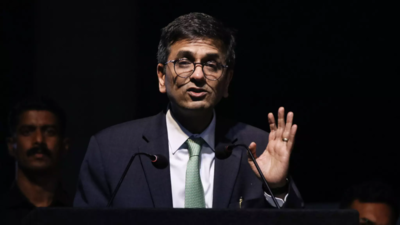
NEW DELHI: The pressure on judges comes not just from the political executive, but also from private interest groups, CJI DY Chandrachud said, during an extensive and frank interaction as Guest Editor of The Times Of India on Saturday.
Elaborating, the CJI, who demits office on Monday, said private interest groups use news TV and social media to create an atmosphere where a judge often feels pressured to go in a particular direction. The price of independence here, he pointed out, is to be subjected to heavy trolling. “You will be trolled, you will be attacked,” he said. On the larger issue of judicial independenceJustice Chandrachud said it’s wrong to measure independence only by looking at judgments where the Supreme Court went against govt views. “It’s a reflection of the state of our polity today,” he observed, arguing polarised views mean that each “end of the spectrum” judges SC’s independence by whether the court concurs with it. “I think I have tried to draw a balance,” the CJI said. He added he’s never tried to fit a judgment to a preconceived view, rather he’s gone where his judicial reasoning took him.
But the CJI and all high court chief justices need to work with govts on the administrative side, Justice Chandrachud said, recounting his efforts to improve judicial infrastructurefunds for which come from govts. Consultation with govts is also key to resolving court-executive differenceshe said, illustrating his point with the SC collegium-Centre differences on selecting judges, an issue that has hit headlines many times.
“I have always been candid with the govt,” CJI said, referring to times when the govt has pushed back on a collegium decision. “But all differences can’t be resolved,” he added frankly. On perhaps the best-known example of those differences – the govt not yet okaying collegium’s decision to appoint lawyer Saurabh Kirpal as an HC judge – the CJI said his view is that neither a prospective judge’s sexuality nor the fact that his partner is a foreign citizen can be held against him when assessing his fitness for the job.
A CJI known for the clarity with which he writes his judgments, he was emphatic in saying judgments written in archaic or bad English did disservice to those seeking justice. And demonstrating he himself was not attached to stale custom, he said he’s for both doing away with the stuffy attire lawyers have to wear in a hot country and simple architecture, not forbiddingly grand, when it comes to building courthouses.



















